Cnl 500 topic 1 Study guides, Class notes & Summaries
Looking for the best study guides, study notes and summaries about Cnl 500 topic 1? On this page you'll find 47 study documents about Cnl 500 topic 1.
All 47 results
Sort by
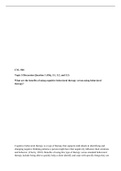
-
CNL 500 Topic 5 Discussion Question 1 (Obj. 5.1, 5.2, and 5.3)
- Other • 2 pages • 2023
-
Available in package deal
-
- $10.49
- 1x sold
- + learn more
CNL 500 (Theories and Models of Counseling) Topic 5 Discussion Question 1 (Obj. 5.1, 5.2, and 5.3) Description: What are the benefits of using cognitive behavioral therapy versus using behavioral therapy?

-
CNL 500 Topic 1 Assignment: Freud's Psychoanalytic Theory Application (Obj. 1.1, 1.2, 1.3, and 1.4)
- Other • 5 pages • 2023
-
Available in package deal
-
- $20.49
- + learn more
CNL 500 (Theories and Models of Counseling) Topic 1 Assignment: Freud's Psychoanalytic Theory Application (Obj. 1.1, 1.2, 1.3, and 1.4) Description: Read the “Case Study Analysis.” Write a 1,000-1,500-word analysis of the case study using Freud’s psychoanalytic theory approach. Include the following in your analysis. 1. What will be the goals of counseling and what intervention strategies are used to accomplish those goals? 2. Describe the process of treatment using this theory. This ...

-
CNL 500 Topic 1 Discussion Question 1 (Obj. 1.3)
- Other • 2 pages • 2023
-
Available in package deal
-
- $10.49
- + learn more
CNL 500 (Theories and Models of Counseling) Topic 1 Discussion Question 1 (Obj. 1.3) Description: Most of the psychological theories reviewed in our text were developed by White European or American males. Given the origins of these theories, how can the information provided be useful to you as a developing mental health professional?

-
CNL 500 Topic 1 Assignment: Freud's Psychoanalytic Theory Application (Obj. 1.1, 1.2, 1.3, and 1.4)
- Other • 5 pages • 2023
- Available in package deal
-
- $17.99
- + learn more
CNL 500 (Theories and Models of Counseling) Topic 1 Assignment: Freud's Psychoanalytic Theory Application (Obj. 1.1, 1.2, 1.3, and 1.4) Description: Read the “Case Study Analysis.” Write a 1,000-1,500-word analysis of the case study using Freud’s psychoanalytic theory approach. Include the following in your analysis. 1. What will be the goals of counseling and what intervention strategies are used to accomplish those goals? 2. Describe the process of treatment using this theory. ...

-
CNL 500 Topic 1 Assignment: Freud's Psychoanalytic Theory Application (Obj. 1.1, 1.2, 1.3, 1.4, and 1.5)
- Other • 5 pages • 2023
-
Available in package deal
-
- $17.99
- + learn more
Read the “Case Study Analysis.” Write a 1,000-1,500-word analysis of the case study using Freud’s psychoanalytic theory approach. Include the following in your analysis. 1. What will be the goals of counseling and what intervention strategies are used to accomplish those goals? 2. Describe the process of treatment using this theory. This should include a description of the length of treatment, the role of the counselor, and the experience of the client as they work from beginning to ter...
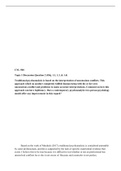
-
CNL 500 Topic 1 Discussion Question 2 (Obj. 1.1, 1.3, and 1.4)
- Other • 2 pages • 2023
-
Available in package deal
-
- $10.49
- + learn more
CNL 500 (Theories and Models of Counseling) Topic 1 Discussion Question 2 (Obj. 1.1, 1.3, and 1.4) Description: Traditional psychoanalysis is based on the interpretation of unconscious conflicts. This approach relied on another completely fallible human being with his or her own unconscious conflict and problems to make accurate interpretations. Comment on how this approach can have legitimacy. Does a contemporary psychoanalytic two-person psychology model offer any improvement in this regard?

-
CNL 500 Topic 1 Discussion Question 1 (Obj. 1.3)
- Other • 2 pages • 2023
-
Available in package deal
-
- $9.99
- + learn more
Most of the psychological theories reviewed in our text were developed by White European or American males. Given the origins of these theories, how can the information provided be useful to you as a developing mental health professional?
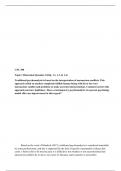
-
CNL 500 Topic 1 Discussion Question 2 (Obj. 1.1, 1.3, & 1.4)
- Other • 2 pages • 2023
- Available in package deal
-
- $9.99
- + learn more
CNL 500 (Theories and Models of Counseling) Topic 1 Discussion Question 2 (Obj. 1.1, 1.3, and 1.4) Description: Traditional psychoanalysis is based on the interpretation of unconscious conflicts. This approach relied on another completely fallible human being with his or her own unconscious conflict and problems to make accurate interpretations. Comment on how this approach can have legitimacy. Does a contemporary psychoanalytic two-person psychology model offer any improvement in this reg...
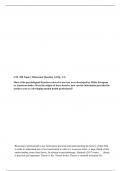
-
CNL 500 Topic 1 Discussion Question 1 (Obj. 1.3)
- Other • 2 pages • 2023
- Available in package deal
-
- $9.99
- + learn more
CNL 500 (Theories and Models of Counseling) Topic 1 Discussion Question 1 (Obj. 1.3) Description: Most of the psychological theories reviewed in our text were developed by White European or American males. Given the origins of these theories, how can the information provided be useful to you as a developing mental health professional?
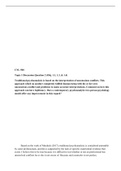
-
CNL 500 Topic 1 Discussion Question 2 (Obj. 1.1, 1.3, and 1.4)
- Other • 2 pages • 2023
-
Available in package deal
-
- $9.99
- + learn more
Traditional psychoanalysis is based on the interpretation of unconscious conflicts. This approach relied on another completely fallible human being with his or her own unconscious conflict and problems to make accurate interpretations. Comment on how this approach can have legitimacy. Does a contemporary psychoanalytic two-person psychology model offer any improvement in this regard?

That summary you just bought made someone very happy. Also get paid weekly? Sell your study resources on Stuvia! Discover all about earning on Stuvia


